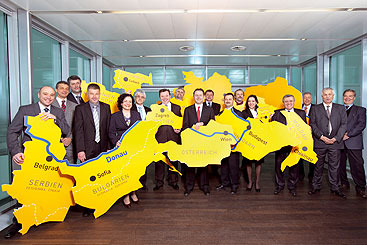Ministerial Meeting 2010: shared waters - joint responsibilities

Ministerial Meeting
2010:
shared
waters - joint
responsibilities
Ministers from all Danube countries, as well as ICPDR observers and representatives from stakeholder groups, strengthened their commitment to transboundary cooperation in the Danube River Basin.

Cooperation in the Danube Basin: in February 2010 Danube ministers and high representatives for water management formally adopted the Danube River Basin Management Plan, a milestone achieved through the joint efforts of all governments as well as the various interest groups in the regions.
Celebrating the Danube and capturing the spirit of the interdependence of Danube countries and the need for cooperation in water management was the focus of a Danube Ministerial Meeting that took place on 16 February. The Danube River Basin Management Plan, an action plan for achieving good status of all Danube Basin waters, was at the centre of discussions at the ICPDR Ministerial Meeting held in Vienna, Austria.
The meeting brought together ministers and high level representatives responsible for water management from the Danube River Basin countries Austria, Bosnia and Herzegovina, Bulgaria, Croatia, the Czech Republic, Germany, Hungary, Montenegro, the Republic of Moldova, Romania, Serbia, Slovakia, Slovenia, Ukraine and the European Commission.
“The Danube waters are shared by us all and therefore we also share the responsibility,” said Mitja Bricelj, Secretary at the Slovene Ministry of the Environment and Spatial Planning and ICPDR President for 2010.
Addressing transboundary issues. The Danube River
Basin Management Plan demonstrates an innovative
approach to basin-wide issues by offering up
answers to the pressures and impacts on water status
in the region. The Danube River Basin Management
Plan outlines concrete measures to be implemented
by 2015 to improve the environmental condition of
the Danube and its tributaries. These include the reduction
of organic and nutrient pollution stemming
from settlements and agriculture, stopping negative
effects of man-made changes to the river, for example
through the construction of fish by-passes, the introduction
of phosphate-free detergents in all markets
and effective risk management of accidental pollution. Measures to protect and reconnect wetlands will
also be taken.
These issues are addressed by the Joint Programme of Measures, which forms an integral part of the Plan. The Joint Programme of Measures will serve as a common roadmap guiding activities in the region and ensuring the necessary harmonisation of actions at the basin level.
Putting the Plan into action. The Danube River Basin Management Plan is a significant first step towards achieving the ‘good status’ of water bodies that the EU Water Framework Directive (WFD) requires. However, measures within the Joint Programme of Measures will not be sufficient to achieve the environmental objectives of the WFD on the basin-wide scale by 2015 and need to be addressed by further actions.
In particular, nutrient pollution loads to the Black Sea will be well below present levels, but will still be 40% above targets. Limitations on phosphates in detergents are particularly cost-effective and necessary measures to complement the efforts of implementing urban wastewater treatment. Ministers at the meeting in February discussed introducing a phosphate ban in all Danube countries, which would set maximum limits for the total phosphorus content in laundry detergents for consumer use by 2012, and a market launch of phosphate-free dishwasher detergents for consumer use by 2015.
Stakeholders make their voices heard. The active involvement of the public is a core principle in sustainable water management. To date, 19 organisations hold observer status and cooperate actively with the ICPDR and many ICPDR observers were on hand to present their views on the future use of the resources.
“Through successful partnerships like ours with the ICPDR, more companies are encouraged to enter into similar relationships to help conquer today’s and tomorrow’s challenges,” said Tony Baynes, Coca-Cola Hellenic, Public Affairs & Communications.
Observers to ICPDR were given the opportunity to make short statements in three groups: Business and Economic Interests, Environmental NGOs and International Organisations, as well as submitting written statements. WWF, Friends of the Earth Germany and BirdLife Germany presented the ICPDR with 100,000 signatures of a petition calling on Danube governments to protect the Danube as a living river and to avoid damage from infrastructure development connected to navigation.
“More than 100,000 citizens from Danube countries have signed our petition for balance navigation projects,” said Hubert Weiger, President of Friends of the Earth Germany. “We handed over this impressive proof of public concern to Danube ministers and called upon them to step up their efforts for a living Danube.”
A message from Danube Youth. Vasyl Vataman from Ukraine, the 15-year old winner of the International Danube Art Master Competition 2009, addressed the Ministerial Meeting to bring the message of the Danube Youth to water ministers.
His artwork, entitled ‘Water Gives Life’, recreated the Danube ecosystem in miniature, presenting the strip of the Danube that is most familiar to him: his village cut in half by the river with its particular features like a wooden bridge, fountain, and a small house and roads. “Let’s make all efforts to protect clean waters of the Danube River Basin – we children at our level and you government officials at yours – because the earth is our common home,” said Vataman.
Commitment to the Danube, now and for the future. As the highlight of the meeting, the ministers of all Danube countries endorsed the ‘Danube Declaration’, which expresses the commitment to further reinforce transboundary cooperation on sustainable water resource management within the Danube River Basin.
“The Danube and its tributaries such as the Sava and the Tisza are lifelines for man and nature. The actions for protection are set – their joint implementation will follow,” says Bricelj.
For more information, and to view a brief film on
the Ministerial Meeting, please visit:
www.icpdr.org/icpdr-pages/mm2010.htm.





